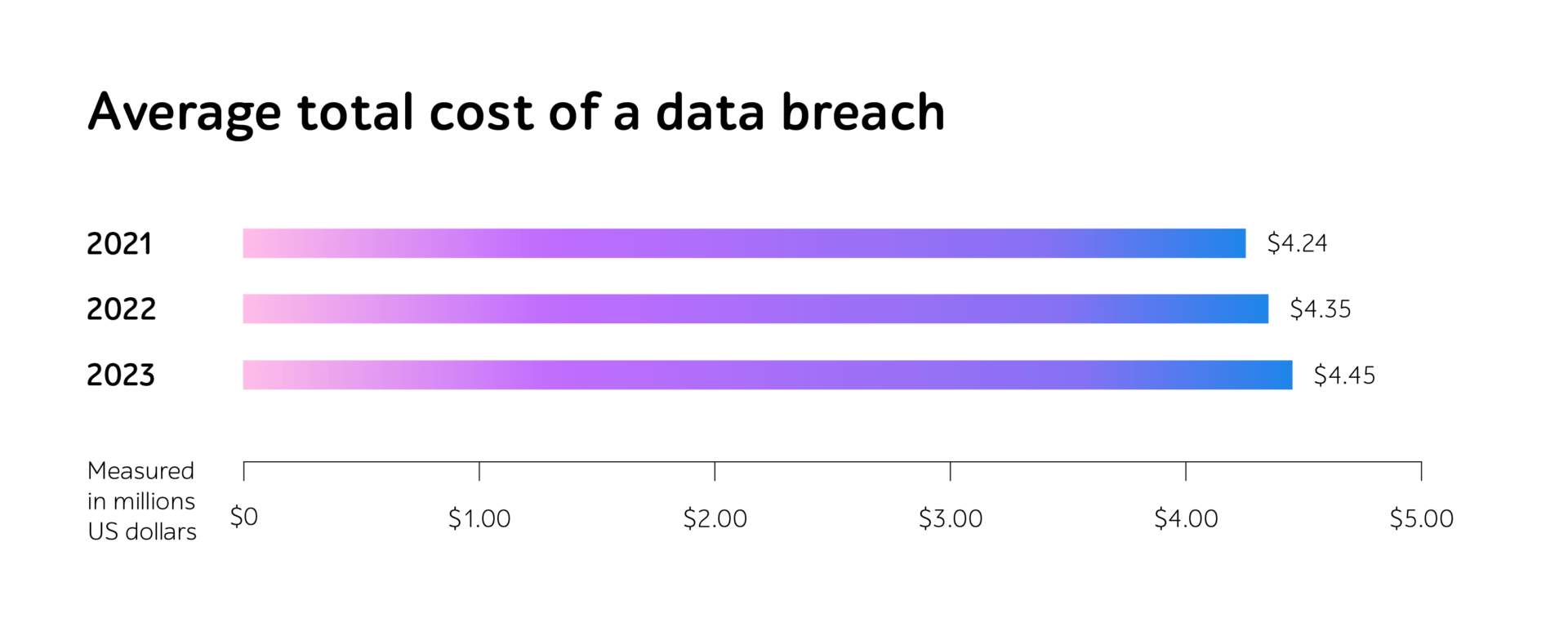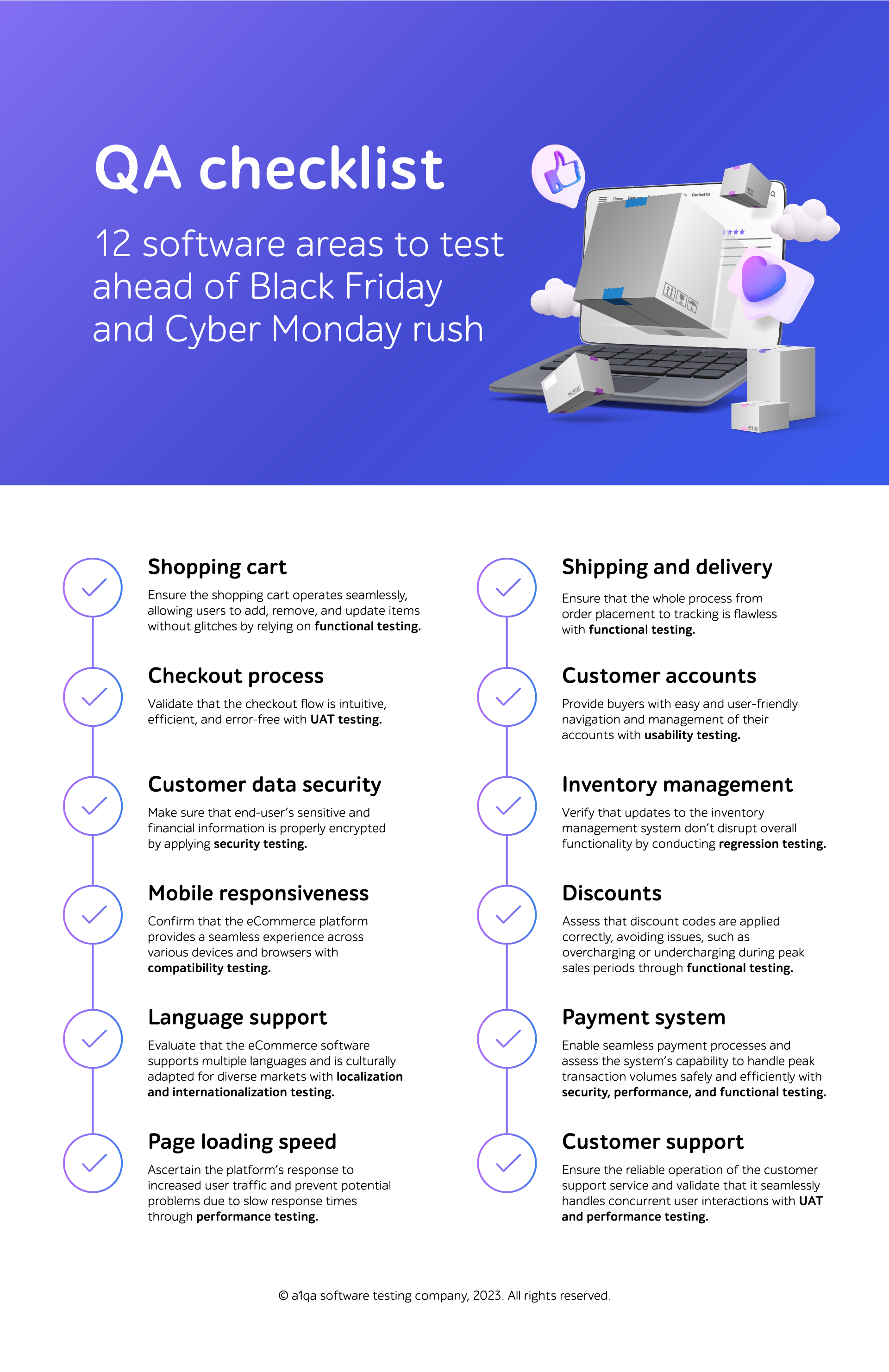
Get ready for Black-Friday-to-Cyber-Monday shopping: 5 testing types to include in your QA strategy
In 2022, 196.7 million Americans made purchases during Black Friday, and 87.2 million of them opted for online shopping.
Consumers are not just waiting for Black Friday and Cyber Monday sell-offs ― eCommerce sales reached $1.04 trillion in 2022 in the USA alone. Making millions, billions, or trillions during these periods is not a fantasy. Flawless operation of websites and mobile apps that withstand the visitors’ influx can make it a reality.
In this article, we’ll discuss 5 testing types, that help ensure high eCommerce software quality and outperform the competition during the wildest shopping weekend.
#1. Performance testing: Are you ready for a spike in shoppers?
The main driver of software failures during holiday sales is online traffic surges. The matter, of course, is that consumers anticipate Black Friday and Cyber Monday shopping year-round. The most crucial question is, “Will my IT solution handle it?” That’s where load testing should come into play to identify critical system bottlenecks under required/peak loads as well as verify such aspects as response time, pressure levels, and the maximum possible load that the app endures.
Customers constantly refresh web and mobile apps’ pages (and 25% of users abandon them if the load takes more than 4-6 seconds), adding and removing goods from the cart. If the software is not stress-resistant, it fails to work under such conditions and may crash or lead to security issues. Here, stress testing helps assess the upper limits of app capacity as well as ensure the high quality of a CRM system used to process online orders.
#2. Usability testing: Glitch-free navigation and interface
Easy browsing, user-friendly navigation, handy catalog ― all of this helps cut down the time to figure out how the app works.
Usability testing detects weak points in UI/UX while providing an intuitive interaction with the eCommerce product. No one wants to spend hours trying to understand how an online store operates — as a result, people turn to rival platforms where everything is crystal clear. So, first and foremost, companies should focus on the system’s ease of use, which 97% of consumers consider their top priority, even over security-related issues (89%).
#3. Functional testing: Does the software meet business requirements?
Cyber Monday. Imagine that the consumer decided to purchase the newest robot vacuum cleaner model, placed the order, and clicked the button to get to the next page. But nothing happens. An awful customer experience is the only thing one receives on this day.
To help the client enjoy the shopping journey, functional testing is a must-have for your business strategy. Shopping cart, login systems, order placement and tracking, various payment options — all of these are equally crucial. Can the user utilize them as intended? Do they work correctly? Are they developed in line with the requirements? Functional tests help answer these questions and prevent the system from unexpected freezes and crashes.
#4. Cybersecurity testing: Are the payments safe enough?
In 2022, Kaspersky detected 38,596,555 phishing attacks targeting users of online shopping platforms while the average cost of a data breach reached $4.45 million. What to expect during Black Friday and Cyber Monday this year, in case your software isn’t prepared for attacks?

Source: Cost of a Data Breach Report 2023
Consequences of poorly protected web and mobile apps include loss of revenue, reputational damage, operational disruption, and more. But the main question: how to bypass it? In addition to general safety tests (to assess the overall security level), it’s vital to implement penetration checks — how does the software operate during an unauthorized intrusion?
And the security of online transactions ― the entire process from order placement to the payment itself should be frictionless allowing for complete protection of customers and their sensitive data, helping increase their loyalty and trust.
#5. Localization testing: Show your app to end users worldwide
During Cyber Monday and Black Friday, customers are reluctant to translate anything they are unfamiliar with or try to understand prices reflected in currencies that they are not accustomed to. An easy task for localization tests ― to meet the cultural and linguistic needs of the buyers and provide seamless user experience for various regions.
So, to delight consumers during holiday sales, businesses should consider reflecting all worldwide shoppers’ cultural features, values, currency, and other critical aspects and ensure that everything works properly. These are some types of localization testing that may be of help:
- Compliance checks ― to validate that the application supports the formatting standards of a particular language and correctly displays currencies, convention rates, phone numbers, addresses, dates, etc.
- GUI checks ― to verify any discrepancies between the localized content and the interface.
- Functional checks ― to detect the glitches in system operation caused by localization.
And of course, do not forget to take one step back. When introducing new functionality, verifying the previous features is imperative to avoid possible software bugs and mitigate the risks. Since the regression tests are repetitive, companies may automate them, reducing testing cycles and redirecting human resources to more valuable tasks.
The ultimate QA checklist to ensure your eCommerce platform peak performance during Black Friday and Cyber Monday
Dive into our checklist and discover how meticulous QA helps enhance 12 pivotal software areas, allowing businesses to withstand the influx of shoppers during holiday sales.

You can download the checklist here.
Summarizing
To enjoy good deals and big profits during Black Friday and Cyber Monday, it’s crucial to pre-test your web and mobile apps and make your QA strategy smart all the way from performance to regression testing.
In case you need professional QA support to prepare your software for Black Friday and Cyber Monday, reach out to a1qa’s experts.








